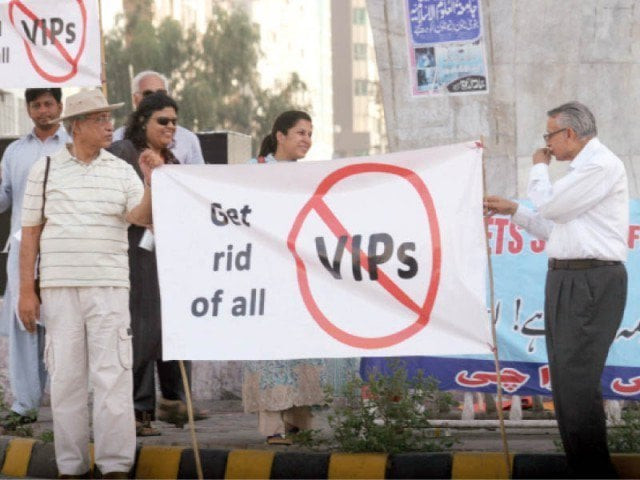#NoToVIPCulture: SHC tags together pleas against VIP culture
The petitioner argued high-speed armed convoys, with their bomb-and-bullet proof cars, scare the masses.

The petitioner argued high-speed armed convoys, with their bomb-and-bullet proof cars, scare the masses. PHOTO: ATHAR KHAN/EXPRESS
Headed by Justice Sajjad Ali Shah, the division bench passed this direction while hearing a non-government organisation's plea against VIP protocols.
Social worker Ansar Burney, who heads the Ansar Burney Trust International, named the President House, Prime Minister House, interior ministry, Sindh home department secretaries and the provincial chief secretary as respondents.
In the plea, Burney said motorcades of public functionaries, including members of parliament, ministers, MPAs and leaders of political parties routinely trampled public sentiments. "VIP protocol has become a menace for society and citizens, being over-defensive in approach, excessive in content and obtrusive in nature, due to which public convenience routinely suffers," Burney argued in the petition.
He said the high-speed movement of VIPs' armed convoys, with their bomb-and-bullet proof cars and tinted windows, scares the masses and causes unnecessary inconvenience to the public. The petitioner alleged that traffic is brought to a standstill and people are held 'hostage' to ensure a smooth drive for the VIPs.
The human rights activist mentioned that ambulances carrying patients get held up in traffic jams, citizens cannot reach airports or train stations on time and doors of hospitals are closed for the public, which leads to the death of patients - all due to VIP movement.
Burney stated that these moves impose an active barrier upon the free movement and liberty of the people. "The basic and fundamental rights enshrined in the Constitution guarantee people the freedom of liberty and movement, subject to reasonable restrictions imposed by the law," the petitioner maintained.
He argued that articles 9, 10, 14, 15 and 25 of the Constitution specifically guarantee rights for the security, liberty, dignity, freedom of movement and equality of all citizens, thereby every person has an inalienable right to enjoy the protection of and be treated in accordance with the law. He pleaded the court direct the respondents to ensure that roads are not blocked during any such movement.
He also sought directions for the respondents not to infringe or curtail public liberty, or violate fundamental rights by closing down service centres such as airports and hospitals or suspending other routine public operations.
Public outcry over the issue has recently gained momentum following the death of an infant in Karachi last month due to VIP movement.
Ten-month-old Bisma, who was suffering from measles and a high fever, died on December 23, 2015, after her father was unable to enter Civil Hospital, Karachi, due to security measures in place for Pakistan Peoples Party chairperson Bilawal Bhutto Zardari, who was inaugurating a trauma centre there.
On the last hearing, the trust's lawyer, Shagufta Burney, had sought a week's time to present the rules or laws, which direct for the provision of VIP protocol.
On Wednesday, when the judges took up the matter, they were informed that some other petition(s) involving the same question were already pending in the court.
At this, the judges directed the office to club all such petitions together and fix them for hearing on the same day so that the same could be heard and decided together.
Published in The Express Tribune, January 14th, 2016.



















COMMENTS
Comments are moderated and generally will be posted if they are on-topic and not abusive.
For more information, please see our Comments FAQ